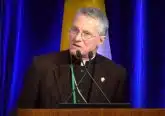U.S. bishops discuss forming ‘eucharistic missionaries’, synodality at spring meeting
Washington, D.C. Newsroom, Jun 15, 2023 / 15:40 pm
During the first public session of their spring meeting in Orlando, Florida, the U.S. bishops discussed spreading the love of the Eucharist as part of their three-year Eucharistic Revival initiative, the Holy Father’s emphasis on synodality, and the ways in which the two are connected as they heard updates on both efforts.
Synodality and the Eucharist
The morning opened with an address from apostolic nuncio to the United States, Archbishop Christophe Pierre, who told the bishops assembled that “the synodal path is less about a ‘program’ and more about a way of being Church.”
Pierre said synodality is not like GPS technology with turn-by-turn directions but more like a compass where “Jesus Christ and his kingdom are the ‘true north,’” and “to find the proper path, we have to immerse ourselves in the reality of our people and listen carefully to the questions and concerns of their hearts.”
He also referred to “living the Eucharist as mission” as a guideline for understanding “the synodal style that Jesus has modeled for us, and which the Holy Father is calling us to adopt.” He called the Eucharist “a dynamic sacrament, imbuing everything we do with the character of Christ’s outgoing love for his people” because it is Christ’s real presence.
Pierre said that the Eucharistic Revival “is a call to let the entirety of our lives be an expression of the Lord’s presence among us: a living-out of the union that exists between our humanity, which Christ has taken to himself, and the divinity into which he leads us.”
He also emphasized the need for the revival to have a missionary character. “To teach the doctrine of the real presence, to promote eucharistic adoration, and to take Our Lord in procession: These initiatives will undoubtedly bear fruit in the lives of the faithful,” he said, “but the fruit will multiply only if the faithful learn that the Eucharist which they receive is meant to make them missionaries — who take the presence of Christ, which is now in them, to people who do not yet know the Lord.”
Update on Eucharistic Revival
Bishop Andrew Cozzens of the Diocese of Crookston, Minnesota, who is heading up the Eucharistic Revival effort, provided the bishops with an update on the initiative Thursday morning. He named some of the successes of its first year, including that 81% of dioceses have designated a point person for the revival, eucharistic preachers have held over 100 revival events in dioceses across the country, and almost 11,000 prayer partners have committed to praying for the revival.
Cozzens also discussed the planning of a two-month National Eucharistic Pilgrimage starting in May 2024 with four major pilgrimage routes ending at the National Eucharistic Congress on July 16, 2024, in Indianapolis, which will be the culmination of the three-year effort.
The bishop called the revival “a generational moment for us,” saying the effort is “really a moment where we can call the Church from all corners of the United States together to be set on fire for mission.” His image of the event, he said, was people coming in from all over the country “and then being set on fire by their experience here and then those torches going back to parishes across the country.”
New USCCB president address
In his first address in his new leadership role, USCCB president Archbishop Timothy Broglio of the Archdiocese for the Military Services, USA, praised the Eucharistic Revival, calling it “an attempt on our part to announce the truth about the mystery of the Eucharist and the real presence of Our Lord and Savior, body, blood, soul, and divinity.”
Broglio touched on other important causes for the U.S. bishops in his speech, including the encouragement of “well-intentioned lawmakers who are seeking to enact effective and humane border management as part of a framework of comprehensive immigration reforms.”
He also asked for prayers for Archbishop Jose Gomez and the Los Angeles faithful as the Los Angeles Dodgers have chosen to honor the “Sisters of Perpetual Indulgence,” an anti-Catholic group that describes themselves as “queer and trans nuns.”
Broglio said that “the disrespect for the truths and traditions of our faith, for the legendary commitment of religious women to building up society, and the tarnishing of what has so often been called the national sport harken back to the ‘know nothings’ of the 19th century.”
He referenced a statement from the bishops inviting the faithful to pray the Litany of the Sacred Heart Friday, June 16, on its solemnity, the same day the Dodgers plan to honor the group.
Cause of the Shreveport Martyrs
In other business, the bishops voted unanimously in favor of advancing the cause on the local level of the beatification and canonization of the Shreveport Martyrs, five French Roman Catholic priests who died ministering to the sick in Shreveport, Louisiana, amid the 1873 yellow fever epidemic.
Health Care Directives revision
The bishops also postponed a vote to Friday on moving forward with a revision of a portion of the Ethical and Religious Directives for Catholic Health Care Services, which covers the relationship between the Catholic medical professional and the patient.
While they cited time constraints, the move could indicate that the bishops would like a more robust discussion Friday of the potential revision, especially given reports that indicate it could update the directives to align with a March doctrinal note from the bishops, which states that “Catholic health care services must not perform interventions, whether surgical or chemical, that aim to transform the sexual characteristics of a human body into those of the opposite sex or take part in the development of such procedures.”













